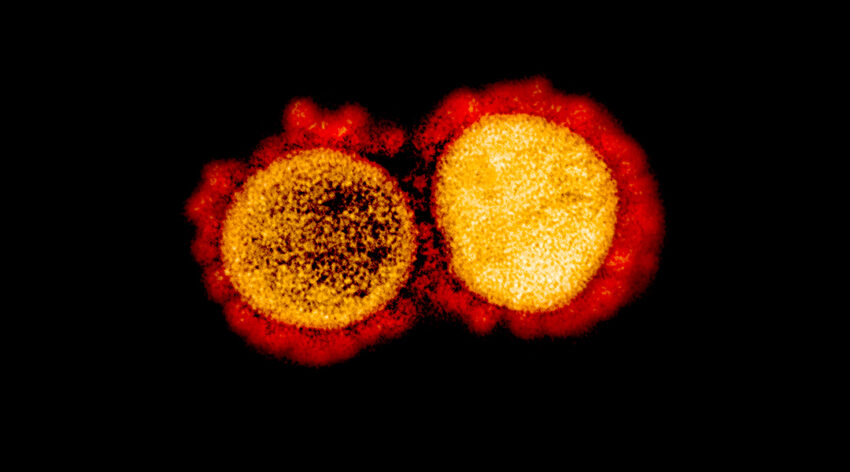US company second to report impressive efficacy for its COVID-19 vaccine candidate.
Color-enhanced transmission electron micrograph of SARS-CoV-2 virus particles. Image credit: NIAID
In an announcement made today, the US-based biotech company Moderna has reported that its vaccine candidate against COVID-19, mRNA-1273, has met the statistical criteria for efficacy, with a vaccine efficacy of 94.5%.
With more than 1 million deaths around the globe and a “dark winter” ahead, breakthroughs in the development of a vaccine are sparking hope. A similar interim analysis of Pfizer and the German firm BioNTech’s vaccine was published earlier this month, which suggest its vaccine is 90% effective at preventing illness.
About mRNA-1273
mRNA-1273 is an mRNA vaccine against COVID-19 that encodes a stabilized form of the SARS-CoV-2 spike protein. It is based on a similar mRNA technology to BioNTech’s vaccine, in which the body is essentially tricked into producing innocuous elements of the viral proteins, such as the spike protein.
The body’s immune system detects these foreign proteins and produces a defensive response against them. If approved, these mRNA vaccines will be the first vaccines of their kind to be licensed, as currently there are no RNA vaccines approved yet for human use.
About the Phase 3 COVE study
In collaboration with the National Institute of Allergy and Infectious Diseases (NIAID), Moderna’s Phase 3 study began in March 2020 with the goal of preventing symptomatic COVID-19 and prevention of infection by SARS-CoV-2. The trial is a randomized, 1:1 placebo-controlled study testing a two-dose mRNA-1273 vaccination in 30,000 participants in the U.S. This means half the cohort received the vaccine and the other half received a placebo.
The COVE study also included participants over the age of 65 as well as those with high-risk chronic diseases that put them at increased risk of severe COVID-19, such as diabetes, severe obesity and cardiac disease. These medically high-risk groups represent 42% of the total participants.
The study also included communities that have historically been under-represented in clinical research and have been disproportionately impacted by COVID-19. The study includes more than 11,000 participants from communities of color, representing 37% of the study population, which is similar to the diversity of the U.S. at large.
The first interim analysis included 95 participants with confirmed cases of COVID-19, of which 90 cases of COVID-19 were observed in the placebo group versus five cases observed in the mRNA-1273 group.
A secondary endpoint from the study also analyzed severe cases of COVID-19, of which 11 occurred in the placebo group and none in the mRNA-1273 vaccinated group. The trial will continue to accrue additional data relevant to safety and efficacy even after emergency authorization use is submitted. Moderna expects the point estimate for vaccine efficacy may change as more cases are reported leading up to the final analysis.
Preliminary analysis also suggests a broadly consistent safety and efficacy profile, with only mild or moderate reactions in patients and with no significant safety concerns. The company plans to submit data from the full study to a peer-reviewed publication.
“This is a pivotal moment in the development of our COVID-19 vaccine candidate,” said Stéphane Bancel, CEO of Moderna. “Since early January, we have chased this virus with the intent to protect as many people around the world as possible. All along, we have known that each day matters. This positive interim analysis from our Phase 3 study has given us the first clinical validation that our vaccine can prevent COVID-19 disease, including severe disease.”
Based on these interim safety and efficacy data, Moderna intends to submit for an Emergency Use Authorization (EUA) with the U.S. Food and Drug Administration (FDA) in the coming weeks and anticipates having the EUA informed of the final safety and efficacy data in the next two months.
Vaccine availability
Moderna has also reported an advantage over the Pfizer vaccine, which requires storage temperatures between –70 and –80 °C. According to the company, it has improved the vaccine’s shelf life by making it more stable, allowing it to be stored at standard refrigeration temperatures of 2 to 8 °C for 30 days and at –20 °C for up to six months. This will make the vaccine significantly easier to store, handle, and deliver.
But at roughly $50 a dose, this makes it the most expensive COVID-19 hopeful vaccine on the market, with other companies such as AstraZeneca and Oxford University or Johnson and Johnson reporting their candidates will cost under $15.
Moderna plans to provide 100 million doses in the US next year, with an option to buy 400 million more. Japan, Canada, Switzerland, Qatar, and Israel have also signed agreements, and the European Commission has a potential purchase agreement for 80 to 160 million doses.
While questions about long term immunity and its ability to help curb the pandemic still remain, these results add to a feeling of optimism, though experts are careful to warn the public to temper their expectations because a vaccine is not necessarily a silver bullet against the virus.
Adapted from original press release provided by Moderna

